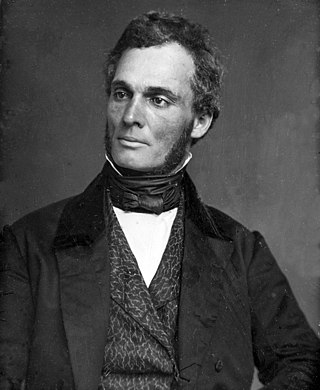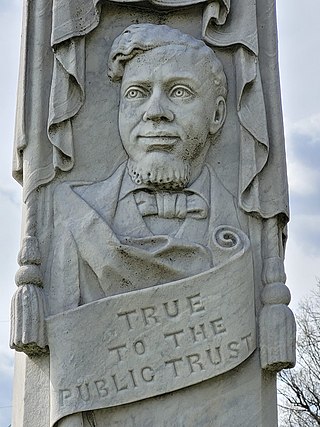Related Research Articles

Cheyney University of Pennsylvania is a public historically black university in Cheyney, Pennsylvania. Founded in 1837 as the Institute for Colored Youth, it is the oldest of all historically black colleges and universities (HBCUs) in the United States. It is a member of the Pennsylvania State System of Higher Education and the Thurgood Marshall College Fund. The university offers bachelor's degrees and is accredited by the Middle States Commission on Higher Education.

Robert Purvis was an American abolitionist in the United States. He was born in Charleston, South Carolina, and was likely educated at Amherst Academy, a secondary school in Amherst, Massachusetts. He spent most of his life in Philadelphia, Pennsylvania. In 1833 he helped found the American Anti-Slavery Society and the Library Company of Colored People. From 1845 to 1850 he served as president of the Pennsylvania Anti-Slavery Society and also traveled to Britain to gain support for the movement.

William Still was an African-American abolitionist based in Philadelphia, Pennsylvania. He was a conductor of the Underground Railroad and was responsible for aiding and assisting at least 649 slaves to freedom towards North. Still was also a businessman, writer, historian and civil rights activist. Before the American Civil War, Still was chairman of the Vigilance Committee of the Pennsylvania Anti-Slavery Society, named the Vigilant Association of Philadelphia. He directly aided fugitive slaves and also kept records of the people served in order to help families reunite.

Winston-Salem State University (WSSU) is a historically black public university in Winston-Salem, North Carolina. It is part of the University of North Carolina system.

Sadie Tanner Mossell Alexander was a pioneering Black professional and civil rights activist of the early-to-mid-20th century. In 1921, Mossell Alexander was the second African-American woman to receive a Ph.D. and the first one to receive one in economics in the United States. In 1927, she was first Black woman to receive a law degree from the University of Pennsylvania Law School and went on to become the first Black woman to practice law in the state. She was also the first national president of Delta Sigma Theta sorority, serving from 1919 to 1923.

George Henry White was an American attorney and politician, elected as a Republican U.S. Congressman from North Carolina's 2nd congressional district between 1897 and 1901. He later became a banker in Philadelphia, Pennsylvania and in Whitesboro, New Jersey, an African-American community he co-founded. White was the last African-American Congressman during the beginning of the Jim Crow era and the only African American to serve in Congress during his tenure.

William Stuart Reyburn was an American politician who served as a Republican member of the U.S. House of Representatives for Pennsylvania's 2nd congressional district from 1911 to 1913. He served as a member of the Pennsylvania House of Representatives for Philadelphia County from 1909 to 1911.

James D. Lynch was a missionary, public official, and state legislator in the United States. He was the first African-American Secretary of State of Mississippi, and a minister.

Thomas Ezekiel Miller was an American educator, lawyer and politician. After being elected as a state legislator in South Carolina, he was one of only five African Americans elected to Congress from the South in the Jim Crow era of the last decade of the nineteenth century, as disfranchisement reduced black voting. After that, no African Americans were elected from the South until 1972.

William J. Simmons was an American Baptist pastor, educator, author, and activist. He was a former enslaved person who became the second president of Simmons College of Kentucky (1880–1890), for whom the school was later named.

Lunsford Lane was an entrepreneur tobacconist from North Carolina who bought freedom for himself and his family. He became a vocal abolitionist and wrote a slave narrative autobiography. His life and narrative shows the plight of slavery, even for the relatively privileged slaves.

Brian Kendall Sims is an American politician, activist and attorney. A Democrat, he was a member of the Pennsylvania House of Representatives for the 182nd district from 2013 until 2022. Sims is also a lawyer and advocate for LGBT civil rights. Sims became the first openly gay elected state legislator in Pennsylvania history. He won re-election on November 6, 2018. He was a candidate for the Democratic nomination for lieutenant governor of Pennsylvania in 2022, finishing in second place behind Austin Davis with 25% of the vote. Since leaving public office in 2022, Sims served as the Managing Director of Government Affairs and Public Policy at Out Leadership, on the Board of Trustees of the Tyler Clementi Foundation, and as CEO of Agenda PAC.
William James Whipper was an abolitionist, trial lawyer, municipal judge, and state legislator in South Carolina. An African American, he volunteered for the United States Army during the American Civil War, serving from 1864 to November 1865 as a member of the 31st Colored Troops. He played an influential role in the state government of South Carolina during Reconstruction. As a delegate to the state's 1868 constitutional convention, he supported women's suffrage, although his motion to allow "every citizen" to vote was not taken seriously at the time. He was a noted political opponent of Robert Smalls as well as a dedicated trial lawyer.

Allan Randall Freelon Sr., a native of Philadelphia, US, was an African American artist, educator and civil rights activist. He is best known as an African American Impressionist-style painter during the time of the Harlem Renaissance and as the first African American to be appointed art supervisor of the Philadelphia School District.

Joanna E. McClinton is an American politician from Pennsylvania currently serving as the 141st Speaker of the Pennsylvania House of Representatives since February 28, 2023. A member of the Democratic Party, she is the first woman to serve as Speaker.

John Sinclair Leary was an American lawyer, politician, federal official, and law school dean. He was of mixed ethnicity. He is described as one of the first black lawyers in North Carolina and was a member of the state legislature from 1868 to 1870. He was an alderman in Fayetteville and later held federal government appointments. He was the first dean of the law school at Shaw University in 1890.

The history of African Americans or Black Philadelphians in the city of Philadelphia, Pennsylvania has been documented in various sources. People of African descent are currently the largest ethnic group in Philadelphia. Estimates in 2010 by the U.S. Census Bureau documented the total number of people living in Philadelphia who identified as Black or African American at 644,287, or 42.2% of the city's total population.

Harry W. Bass was an American lawyer and politician who became the first African American to serve in the Pennsylvania House of Representatives, winning two consecutive terms in 1911 and 1913 to represent the sixth district of Philadelphia.
Samuel Beecher Hart was a state legislator in Pennsylvania. He served multiple terms.
References
- ↑ Bois, William Edward Burghardt Du (November 8, 1927). "The Crisis". National Association for the Advancement of Colored People – via Google Books.
- 1 2 "Official Website - PA House Archives Official Website". archives.house.state.pa.us.
- ↑ Smith (Jr.), John Clay (1999). Emancipation: The Making of the Black Lawyer, 1844-1944. University of Pennsylvania Press. pp. 160, 189. ISBN 978-0-8122-1685-1.